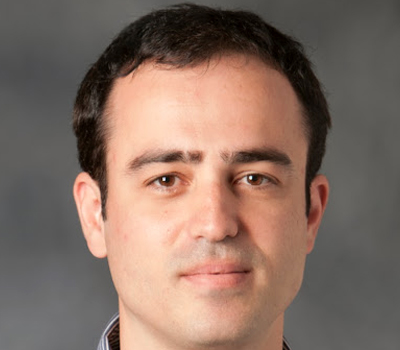Analyzing the chemical and biological health of our oceans
Climate change has received considerable press in recent years as we observe crucial changes in weather patterns and atmospheric composition. Professor Nicolas Cassar in the Division of Earth and Ocean Sciences at Duke University is studying, and developing new methods to study, chemical changes in our environment. Dr. Cassar's work focuses on carbon, nitrogen and oxygen movement between the oceans and the atmosphere. Particular attention is directed towards Earth's polar regions, the Arctic and Antarctica, due to their rapidly changing environments and disproportionate influence on global climate.
At the nexus of chemistry, biology and atmospheric and oceanic sciences, Dr. Cassar's research is directed at furthering our understanding of the feedbacks between climate and the cycling of elements such as carbon and oxygen. Oceanic carbon is important in numerous ways. There is 50-60 times more carbon in the oceans than in the atmosphere. Over geological timescales, the exchange of this large reservoir of carbon with the atmosphere is believed to have had a large impact on carbon dioxide present in the atmosphere, and thereby climate.
Furthermore, a large proportion of fossil fuel carbon dioxide and heat associated with global warming have been absorbed by the oceans. This has led to an unprecedented rate of change in marine ecosystems. We are venturing into unknown territory with respect to environmental health. Dr. Cassar is studying what factors regulate the rate at which carbon is transferred, and what some of the long-term impacts may be. Working not just as a chemist, but as an environmental engineer and biologist, Dr. Cassar is asking multi-disciplinary questions such as: How might pH change affect marine life, and what influence does the population makeup of marine life have on carbon exchange and ocean fertility?
Our understanding of the feedbacks between biology and chemistry are mostly qualitative (lacking hard statistics). This is partly attributable to limited observations. Current sampling methods are too infrequent to provide efficient and accurate results, providing only poor constraints on biological processes. Dr. Cassar's innovative toolsets provide a biogeochemical compass to direct sampling strategy, identify regions of biological interests, and estimate the fluxes of elements at unprecedented resolution. As an example, Dr. Cassar is developing a novel and unique method for effective measurement of nitrogen fixation. Nitrogen is a limiting nutrient in many ecosystems. As a dominant source of new nitrogen to these ecosystems, biological nitrogen fixation influences terrestrial and oceanic fertility and, in the process, the global carbon cycle. However, the factors influencing nitrogen fixation and its distribution are not yet well understood. Dr. Cassar's new method is rooted in chemistry and engineering, but is designed to better understand the microbiology. It increases the frequency, and therefore sensitivity, of measurements by several orders of magnitude.
Bio
Dr. Cassar's research career began at an early age with an interest in basic fundamental science. Chemistry, math and biology offered an outlet, but Dr. Cassar craved something more environmentally relevant, which directed him toward oceanography and biogeochemistry. Fantastic mentors helped Dr. Cassar specialize in the work he does today. An additional attraction to this research is the opportunity for adventure, exploring some of Earth's most pristine and remote regions.
Dr. Cassar's research focuses on environmental biogeochemistry and physiology, with the objective of constraining the mechanisms governing carbon cycling and climate. Current research interests include (1) ocean carbon cycles and productivity, (2) carbon acquisition mechanisms in marine phytoplankton and implications for climate change and paleo-CO2 reconstruction, and (3) global carbon cycle and ocean-atmosphere fluxes. His scientific approach is interdisciplinary, integrating field observations, laboratory experiments, modeling and theory.
In the News
Duke Environment
Duke University


